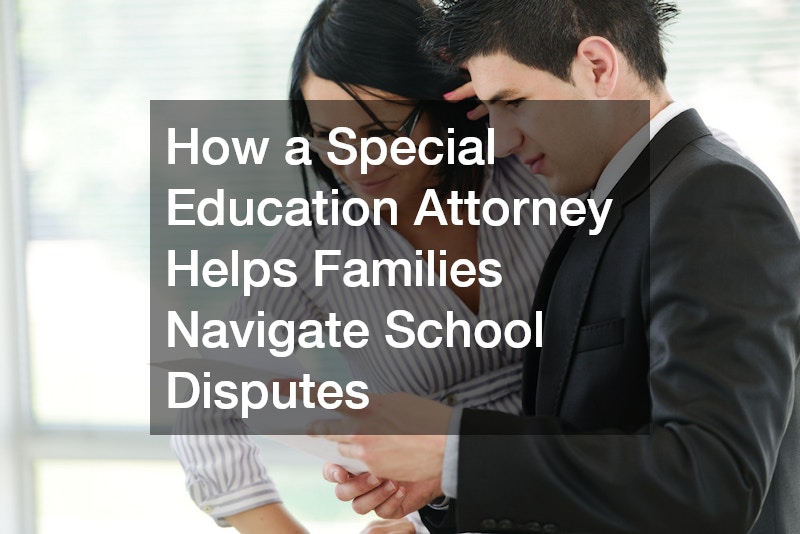
Dealing with school disputes can be a challenging and stressful experience for families of children with special needs. Navigating the maze of educational laws, regulations, and individual needs requires expertise and understanding. This is where a special education attorney becomes indispensable. By offering legal advice and representation, they ensure that children’s educational rights are upheld.
Understanding how they operate can better prepare families for any educational challenges that may arise.
Understanding the Role of a Special Education Attorney
A special education attorney specializes in issues related to the educational rights of children with disabilities. They are well-versed in the complex laws and regulations that govern special education, such as the Individuals with Disabilities Education Act (IDEA). These attorneys work with families to ensure that schools provide appropriate accommodations and modifications for their children. Often, families are unaware of their rights and available resources, making legal guidance crucial. Special education attorneys bridge the gap between families and schools, advocating for the student’s best interests.
The attorney’s involvement begins with understanding the child’s unique needs and educational challenges. This involves reviewing medical reports, Individualized Education Programs (IEPs), and other relevant documentation. They then identify any discrepancies between the child’s needs and the services being provided by the school. It is common for families to experience resistance from schools when discussing necessary accommodations. Attorneys use their legal knowledge to negotiate and, if necessary, litigate to secure appropriate educational plans.
Additionally, a special education attorney provides emotional support to families during disputes. The process can be emotionally draining, with parents often feeling isolated and helpless. Attorneys not only offer legal solutions but also act as advocates who empower parents. By assuring families that their concerns are valid and that they have legal support, attorneys help mitigate feelings of anxiety and frustration. The assurance of having a professional to handle complicated legal matters allows families to focus more on their children’s well-being.
Navigating the IEP Process with a Special Education Attorney
The Individualized Education Program (IEP) is a cornerstone for special education students. A special education attorney plays a significant role in navigating this process to ensure that it meets the child’s needs. Developing an effective IEP requires collaboration between the family, educators, and administrators. However, conflicts can arise when there is disagreement on the services or accommodations provided. An attorney assists in resolving these conflicts by advocating for a legally compliant and beneficial IEP.
The attorney’s involvement begins with a thorough examination of the current IEP. They assess whether it adheres to the legal requirements intended to benefit the student. If there are inadequacies, the attorney will attend IEP meetings to advocate for necessary changes. This advocacy may include negotiating for additional resources, changes in classroom settings, or introducing supplementary services. With an attorney present, schools are often more willing to accommodate requests, knowing legal consequences may follow noncompliance.
When communication between schools and families breaks down, an attorney acts as a mediator. They ensure that the conversation remains productive and focused on the child’s educational welfare. Attorneys help prevent miscommunications that could otherwise lead to ineffective IEPs or adversarial relationships. By maintaining a clear dialogue, all parties involved are more likely to work collaboratively. This collaboration often results in better educational strategies and outcomes for the student.
Resolving Disputes Through Legal Action
Despite positive efforts to reach amicable resolutions, some disputes require legal action. In such cases, a special education attorney prepares for a hearing or trial. These legal proceedings involve presenting evidence that supports the student’s need for specific accommodations or services. The attorney works with families to gather necessary documentation, witness testimonies, and expert opinions. Preparation is meticulous, as a well-documented case increases the likelihood of a favorable outcome.
Taking legal action can be daunting for families, but attorneys guide them through the process step-by-step. They explain legal terms and procedures to ensure that families understand their rights and options. Attorneys also remain sensitive to the emotional impact that legal disputes may have on the family. Their support helps alleviate stress, allowing parents to concentrate on managing their child’s overall development. Importantly, legal victories achieved by attorneys serve not only individual families but also set precedents that benefit other students facing similar challenges.
The Importance of a Specialized Legal Advocate
The complexities of special education law make having a specialized legal advocate essential. A special education attorney not only possesses a deep understanding of relevant legal frameworks but is also attuned to the unique challenges faced by families of children with disabilities. They offer strategic advice tailored to individual circumstances. This personalized approach makes it possible to craft effective legal strategies that address specific needs. The confidence of having an expert advocate often translates into better educational opportunities for the child.
An attorney’s expertise is particularly useful in interpreting educational assessments, policy documents, and legal stipulations. These documents can be overwhelming and complex for families without legal backgrounds. By distilling relevant information, attorneys enable families to make informed decisions about their child’s education. Having a knowledgeable ally also helps balance the power dynamics often present in school negotiations. This balance increases the likelihood of equitable and mutually beneficial resolutions.

